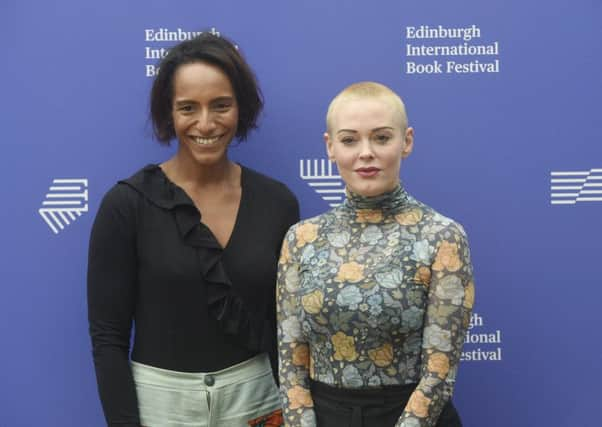Edinburgh Book Festival: Rose McGowan on taking back her identity


The actress, director and writer was invited to the Book Festival by guest selector Afua Hirsch, who is curating a strand of the programme on the theme of identity.
Tiny (even in her platform boots), with cropped blonde hair and a no-nonsense expression, McGowan spoke about her memoir, Brave, and about taking back control of her own identity by challenging the power brokers of Hollywood. McGowan was one of the first to speak out about alleged sexual harassment by movie mogul Harvey Weinstein, launching the #MeToo movement. However, for her, the decision to speak was part of a much wider story.
Advertisement
Hide AdAdvertisement
Hide AdShe was already writing Brave, and looking for ways to “challenge the existing order” in the film industry. “The streets of Hollywood are paved with the bodies of the vulnerable,” she said. “I know. I was almost one of them.”
McGowan was a teenager when she was cast in her first film role – having grown up in the Children of God cult in Italy, becoming a homeless teenage runaway at 13 – and divorced her parents two years later. • READ MORE: Edinburgh Festival 2018: 7 shows you have to see in week two
She has become an outspoken activist about the culture of sexism and misogyny in Hollywood, but her stance has not been without cost. She described how the stress of the past year “nearly snapped me… I felt like I was manning the Titanic and just not allowing it to sink this time,” and said that she currently lives out of two suitcases, having sold her Hollywood home.
Later in the afternoon, Hirsch was back on stage with two more guests, novelists Diana Evans and T Geronimo Johnson. Evans, who won an array of awards for her first novel 26A, was talking about her third, Ordinary People, which chronicles the lives of middle-class black Londoners, while Johnson, a black writer raised in New Orleans, has written Welcome to Braggsville, about a white teenager from small town Georgia who goes to study at Berkeley, thus bringing together two extremes of American society.
Both agreed that racism is far more insidious than most people think, even in the literary world, with novels by writers of colour rarely discussed separately from the politics of race. As a black writer who has written a white protagonist, Johnson said: “I think more writers should write across the aisle… Literature is the machinery of empathy. Everyone should expand their cast of characters.”